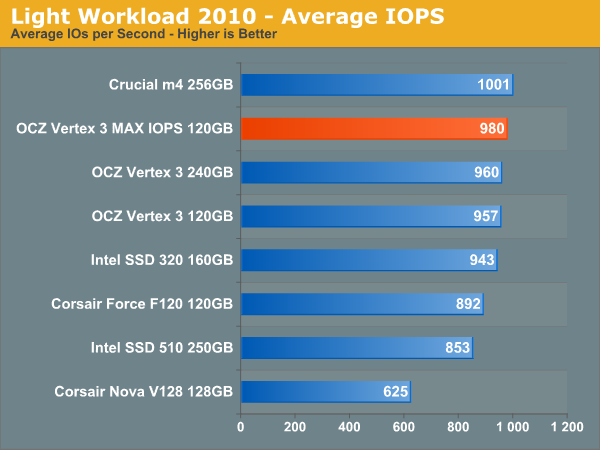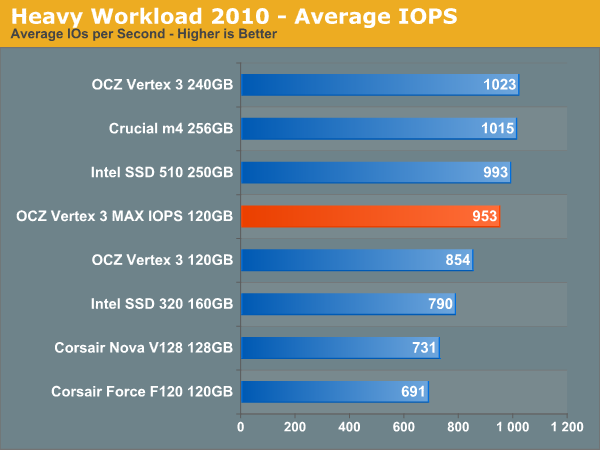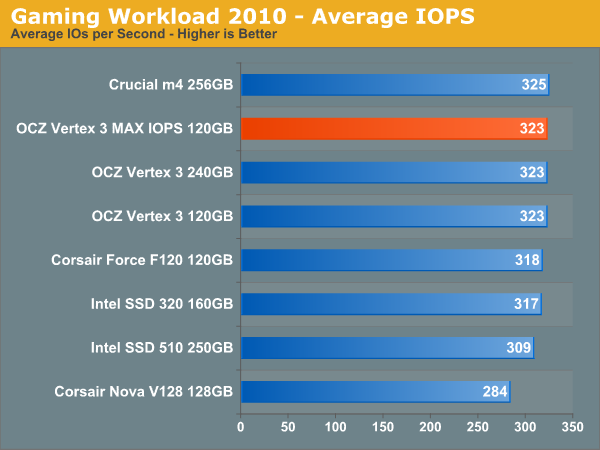OCZ Vertex 3 MAX IOPS & Patriot Wildfire SSDs Reviewed
by Anand Lal Shimpi on June 23, 2011 4:35 AM ESTAnandTech Storage Bench 2010
To keep things consistent we've also included our older Storage Bench. Note that the old storage test system doesn't have a SATA 6Gbps controller, so we only have one result for the 6Gbps drives.
The first in our benchmark suite is a light/typical usage case. The Windows 7 system is loaded with Firefox, Office 2007 and Adobe Reader among other applications. With Firefox we browse web pages like Facebook, AnandTech, Digg and other sites. Outlook is also running and we use it to check emails, create and send a message with a PDF attachment. Adobe Reader is used to view some PDFs. Excel 2007 is used to create a spreadsheet, graphs and save the document. The same goes for Word 2007. We open and step through a presentation in PowerPoint 2007 received as an email attachment before saving it to the desktop. Finally we watch a bit of a Firefly episode in Windows Media Player 11.
There’s some level of multitasking going on here but it’s not unreasonable by any means. Generally the application tasks proceed linearly, with the exception of things like web browsing which may happen in between one of the other tasks.
The recording is played back on all of our drives here today. Remember that we’re isolating disk performance, all we’re doing is playing back every single disk access that happened in that ~5 minute period of usage. The light workload is composed of 37,501 reads and 20,268 writes. Over 30% of the IOs are 4KB, 11% are 16KB, 22% are 32KB and approximately 13% are 64KB in size. Less than 30% of the operations are absolutely sequential in nature. Average queue depth is 6.09 IOs.
The performance results are reported in average I/O Operations per Second (IOPS):

If there’s a light usage case there’s bound to be a heavy one. In this test we have Microsoft Security Essentials running in the background with real time virus scanning enabled. We also perform a quick scan in the middle of the test. Firefox, Outlook, Excel, Word and Powerpoint are all used the same as they were in the light test. We add Photoshop CS4 to the mix, opening a bunch of 12MP images, editing them, then saving them as highly compressed JPGs for web publishing. Windows 7’s picture viewer is used to view a bunch of pictures on the hard drive. We use 7-zip to create and extract .7z archives. Downloading is also prominently featured in our heavy test; we download large files from the Internet during portions of the benchmark, as well as use uTorrent to grab a couple of torrents. Some of the applications in use are installed during the benchmark, Windows updates are also installed. Towards the end of the test we launch World of Warcraft, play for a few minutes, then delete the folder. This test also takes into account all of the disk accesses that happen while the OS is booting.
The benchmark is 22 minutes long and it consists of 128,895 read operations and 72,411 write operations. Roughly 44% of all IOs were sequential. Approximately 30% of all accesses were 4KB in size, 12% were 16KB in size, 14% were 32KB and 20% were 64KB. Average queue depth was 3.59.

The gaming workload is made up of 75,206 read operations and only 4,592 write operations. Only 20% of the accesses are 4KB in size, nearly 40% are 64KB and 20% are 32KB. A whopping 69% of the IOs are sequential, meaning this is predominantly a sequential read benchmark. The average queue depth is 7.76 IOs.











112 Comments
View All Comments
TrackSmart - Thursday, June 23, 2011 - link
My problem is not the failure rate of OCZ (or Corsair or Patriot) SSDs. Ordinary hard disks that we've been using forever have a 1-3% failure rate (or worse for some models). The problem is customer support for drives that aren't merely failing, but are *failing to be compatible* with particular hardware configurations.How a company deals with such problems is what determines if they deserve customer loyalty. And let me tell you that sending customers another of the same drive, that they know won't work with their system, is not a way to win customer loyalty. Just issue a refund and let the customer buy a different model. With that kind of treatment, the customer might buy another OCZ drive, but from one of the other product lines - instead of leaving angry.
The customer support issue is the one I want OCZ to address. And if Anandtech has personal communications with them, that is something worth passing on.
Anand Lal Shimpi - Thursday, June 23, 2011 - link
The issue is that, apparently, the majority of customers don't have a problem. There isn't a day that goes by where I'm not testing an SF-2281 drive in some fashion. Now it's possible that my usage model and test scenarios aren't enough to cause the problem, but I suspect that it's more complicated than that.My recommendation continues to be the Intel SSD 510 if you want the best balance of performance/predictable reliability. However if I simply recommend Intel's drive without mentioning a cheaper/faster drive I think I'll get accused of a different sort of bias :-P
Take care,
Anand
techinsidr - Thursday, June 23, 2011 - link
Good point Anand... I'm personally not a fan of OCZ products, but I give you props all the hard work you do on this site. Even if I don't agree with your recommendations 100% of the time, you still have the best hardware review site out there.I hope OCZ and Sandforce gets this problem figured out sooner than later. Performance is definitely important, but at the end of the day I think reliability is even more critical.
TrackSmart - Thursday, June 23, 2011 - link
I agree that it's a small percent, but is it okay to tell 10,000 customers "sorry, use it in a different computer" when they've spent $240 on a storage device? Just because it represents *only* 0.5% of their customers?Thanks for taking the time for a personal reply. And thanks for the superb articles and reporting. We'll just have to agree to disagree on what it means for a company to stand by a product.
Anand Lal Shimpi - Thursday, June 23, 2011 - link
No I agree that's not ok, but to the best of my knowledge OCZ has always facilitated a refund if you ask for one with situations like this. OCZ has apparently even offered to send engineers to your house and loan you a notebook to help diagnose the issue back when they had trouble tracking it down.My preference would be a stop shipment order until the problem is corrected. But in terms of customer service, I believe OCZ typically does take care of its customers.
Take care,
Anand
TrackSmart - Thursday, June 23, 2011 - link
Thanks Anand. I've had good experience with other OCZ products and associated support in the past. And it's possible that the 25nm debacle has caused them to shift their policies. At the time, when I purchased a Vertex 2, I was told replacement with a like item was the only option. Newegg came to my rescue and took the drive back, despite their clearly stated policy that SSD returns have to go to the manufacturer. Good on Newegg for understanding my situation. And hopefully good on OCZ if their policies have improved.A google search turns up people from the past who were turned down for Vertex 2/Agility 2 refunds (responses: firmware is on the way or use it in a compatible system - only exchanges for like models). But shows that Vertex 3 owners have been getting refunds.
So maybe I'm behind the times. And if so, my apologies to OCZ. These changes of policy must be within very recent past. A bit of bad press seems to go a long way to changing corporate policy.
jonup - Thursday, June 23, 2011 - link
Why is this review questionable? His recommendation is based on his personal experience with the drives. He has not experienced any BSODs but he disclosed that there are certain drives sold in retail that have the issue. He recommended OCZs drive as much as he recommended the Patriot's.I wouldn't be supprise if majority of the BSOD result from user tweaks and maybe if it is even a Windows problem.
semo - Thursday, June 23, 2011 - link
I wouldn't be as harsh and say that Anand has had underhand dealings with OCZ but there are bridges there. He gets new OCZ SSDs well before release dates so that he can prepare for in-depth articles. These articles bring a boat load of traffic to his domain.So indirectly, Anand does benefit from being on good terms with OCZ because if he didn't, he wouldn't have those golden samples and those spikes in traffic at launch.
Then again, timing is not the only thing that keeps us techies coming back. The quality of the articles plays a big part as well. I am however starting to question the Integrity of his work given the outcry in the community which is not proportionally reflected in Anand's official articles (this article touches on a few of the issues but the huge outcry from the last article must have played a big part). Also, I'm not just a techie, I'm also a consumer and I totally disagree with OCZ's handling of the 25nm fiasco and their customer relations in general.
Needless to say, I still enjoy Anand's articles but I will never touch an OCZ product again. Other companies provide just as much value and performance as them.
techinsidr - Thursday, June 23, 2011 - link
I couldn't agree more semo... I did a blog article covering this whole fiasco at my website techinsidr.com . The way OCZ has handled this fiasco leaves a lot to be desired..Anand Lal Shimpi - Thursday, June 23, 2011 - link
Access to hardware is never a reason to treat a manufacturer favorably. That may win you some short term gains but long term you lose credibility, which will ultimately and drives away the sort of quality readers you need to have a site truly survive.Also note that while exclusives do bring in more traffic, you actually build more traffic by being consistent and delivering quality over time. The former doesn't guarantee lasting traffic.
I don't believe OCZ is getting favorable treatment here, just the treatment that is representative of my experience with the drives. Now the response from the readership is clear that despite my experience, there's definite unease with actually jumping on the OCZ bandwagon until these sorts of complaints go away entirely. I can completely understand that sentiment and I will make sure it's reflected as we continue to cover this space.
Take care,
Anand